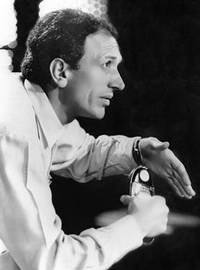Carlo Di Palma
Carlo Di Palma | |
|---|---|
 | |
| Born | 17 April 1925 |
| Died | 9 July 2004 (aged 79) Rome, Italy |
| Occupation | Cinematographer |
| Years active | 1954–1997 |
| Spouse | Adriana Chiesa |
Carlo Di Palma (17 April 1925 – 9 July 2004) was an Italian cinematographer, renowned for his work on both color and black-and-white films, whose most famous collaborations were with Michelangelo Antonioni and Woody Allen.
Early life
[edit]Carlo Di Palma was born into a poor Roman family; his mother was a flower seller on the Spanish Steps,[1] while his father was a camera operator for a number of Italian film studios.[2] In an interview shortly before his death, Di Palma recounted his childhood memories of observing his father in action: "I'd run to the studio or the location, and watch my father work. I was fascinated by the whole experience. I would stand on a crate sometimes and watch. All of the people that were on the location were pleasant to me. I was very quiet and observant, so with that they let me stay on set. I would watch many different directors over and over."[2]
Career
[edit]Di Palma's collaborations with Antonioni included Il deserto rosso (1964); the "Il provino" segment in I tre volti (1965); Blowup (1966); Identification of a Woman (Identificazione di una donna) (1982). With Woody Allen, he worked on Hannah and Her Sisters (1986), Radio Days (1987), September (1987), Alice (1990), Shadows and Fog (1991), Husbands and Wives (1992), Manhattan Murder Mystery (1993), Bullets Over Broadway (1994), Don't Drink the Water (1994), Mighty Aphrodite (1995), Everyone Says I Love You (1996), and Deconstructing Harry (1997). He also worked with many other noted film directors during his long and productive career.
He is also a little-known film director.[3]
Carlo Di Palma moved from Italy to the United States in 1983.
He won a Silver Ribbon for best cinematography four times: in 1965 for Il deserto rosso, in 1967 for L'armata Brancaleone, in 1993 for Shadows and Fog, and in 1997 for Mighty Aphrodite, as well as the Outstanding European Achievement in World Cinema award in 2003.
Later years
[edit]Di Palma was hired to shoot Allen's film Anything Else (2003), and actually started location scouting before failing an insurance physical, which was required for all key personnel on the crew, resulting in his replacement by Darius Khondji, to Di Palma's great disappointment, as he had been eager to work again after having been on the sidelines for the past six years.[4]
Personal life
[edit]In the 1980s, Di Palma married Adriana Chiesa, an exporter of Italian films. She nursed him through his final illness.[1]
Filmography
[edit]Cinematographer
[edit]Film
[edit]Short film
[edit]| Year | Title | Director | Notes |
|---|---|---|---|
| 1963 | Le lièvre et la tortue | Alessandro Blasetti | Segment of Three Fables of Love |
| 1965 | Il provino | Michelangelo Antonioni | Segment of The Three Faces |
| 1966 | Fata Sabina | Luciano Salce | Segment of Sex Quartet |
| 1970 | Il frigorifero | Mario Monicelli | Segment of Le coppie |
| 1989 | Roma | Michelangelo Antonioni | Segment of 12 registi per 12 città |
Television
[edit]| Year | Title | Director | Notes |
|---|---|---|---|
| 1981 | Great Performances | Jean-Pierre Ponnelle | Episode "La clemenza di Tito" |
| 1983 | Ritorno a Lisca Bianca | Michelangelo Antonioni | TV documentary short |
| 1994 | Don't Drink the Water | Woody Allen | TV movie |
Director
[edit]- Teresa the Thief (1973)
- Blonde in Black Leather (1975) (Also writer)
- Mimì Bluette... fiore del mio giardino (1976)
- L'addio a Enrico Berlinguer (1984) (Documentary film)
References
[edit]- ^ a b Lane, John Francis (13 July 2004). "Carlo Di Palma: Italian master of cinematography". The Guardian. Retrieved 28 September 2012.
- ^ a b Szklarski, Stephen J. "Carlo Di Palma: An interview". Independent Film Quarterly. Archived from the original on 12 December 2019. Retrieved 28 September 2012.
- ^ Moliterno, Gino (2009). The A to Z of Italian Cinema. Scarecrow Press. pp. 114–15. ISBN 9780810870598. Retrieved 8 December 2022.
- ^ Tonguette, Peter. "Carlo Di Palma: An Appreciation and a Remembrance". Senses of Cinema. Film Victoria. Retrieved 28 September 2012.
External links
[edit]- Carlo Di Palma at IMDb
- Carlo Di Palma interview, by Nicholas Pasquariello in April, 1974
